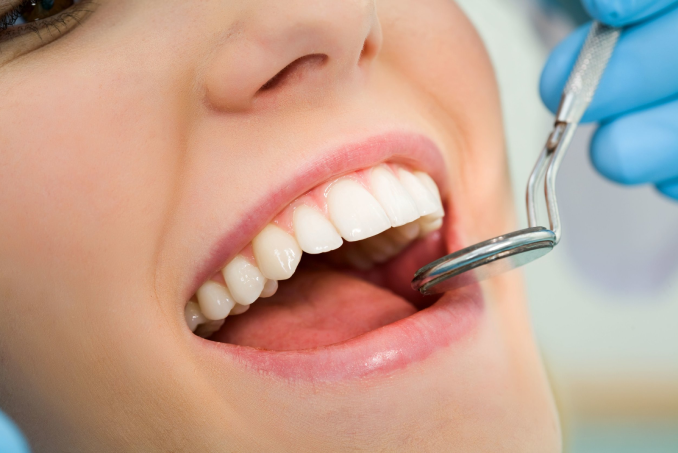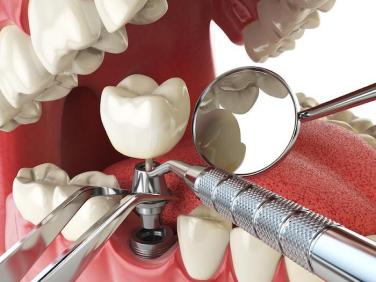DENTAL IMPLANTS MURRAY UT
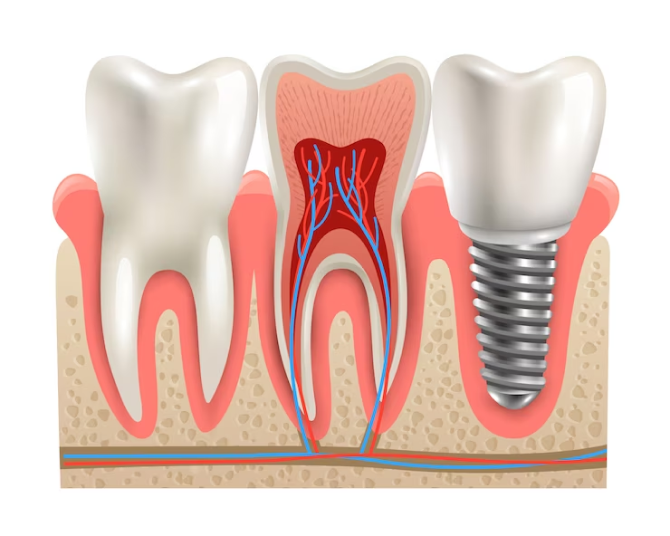
What Are Dental Implants?
Are you looking for dental implants in Murray, UT? Our expert team is here to assist you in restoring your smile with top-tier dental care. Dental implants are a durable, lifelike solution for replacing missing teeth, offering advantages over traditional dentures and bridges. They’re crafted to mimic the appearance, feel, and function of natural teeth, enhancing both your oral health and self-esteem.
The process involves inserting a small titanium post into your jawbone, which serves as an artificial tooth root. As time passes, the post integrates with the bone in a process called osseointegration, providing a stable foundation for a custom-made crown that seamlessly matches your smile.
Dental implants offer numerous benefits. There’s no need for adhesives, they remain securely in place, and they’re simple to maintain—just brush, floss, and schedule regular checkups. Additionally, they help prevent bone loss associated with missing teeth and offer great support for eating and speaking. If you’re ready to get dental implants in the Murray, UT area, reach out to us today!
Dental implants are a great way to boost your confidence by bringing back the natural look and feel of your teeth. Whether you’re replacing a single tooth or an entire row, our affordable dental implants near Murray are crafted to be strong, functional, and aesthetically pleasing. Ready to take the next step? Contact us today or click the button below to book your appointment—we’re just around the corner!
Dental Implants Murray Utah
At Utah Periodontal Specialists, we’re committed to providing outstanding care with the most advanced techniques available. Understanding the importance of convenience, we offer dental implants near Murray to better meet the needs of our patients.
Our highly trained and knowledgeable specialists are committed to improving your periodontal health and achieving outstanding results. From dental implants and gum grafts to treating gum disease and other procedures, we provide personalized care tailored to your specific needs.
When you choose dental implants near Murray, you’ll find a welcoming atmosphere where your comfort and health are our top priorities. Our modern clinic is equipped with cutting-edge technology and tools, enabling us to deliver treatments that are both effective and gentle. This dedication to high-quality care guarantees a smooth and comfortable experience from beginning to end.
Murray Dental Implants Cost
The cost of dental implants in the Murray area can vary depending on several factors, including the number of implants needed, the complexity of the case, and the type of implant you choose. In our office, you can expect to pay approximately $2,000 per implant without insurance. The costs will likely be much lower if you have dental insurance. Keep in mind that this is just an estimated range, and it’s essential to consult with our staff to get a more accurate quote based on your individual needs and circumstances. Dental implant costs may also include additional expenses for procedures like implant placement surgery, abutment placement, and the final dental crown or prosthetic. Additionally, dental insurance coverage, if applicable, can significantly impact the overall out-of-pocket expenses for dental implants.
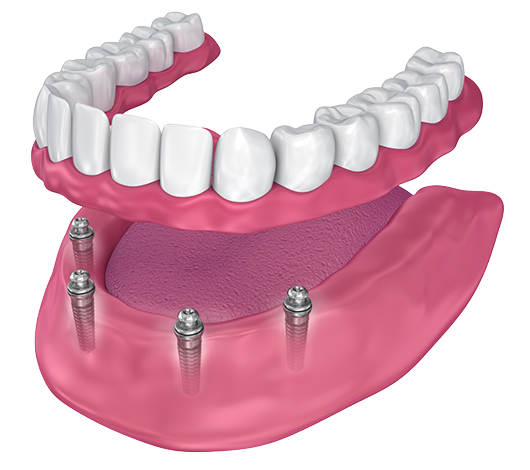
Different Types of Dental Implants
Dental implants come in various types, each designed to cater to specific dental needs and conditions. Here are some of the most common types of dental implants:
- Endosteal Implants: Endosteal implants are the most widely used type of dental implants. They are placed directly into the jawbone through a surgical procedure. These implants are typically made of titanium and have a screw-like shape. Endosteal implants are suitable for patients with sufficient bone density and are commonly used for single tooth replacement, multiple teeth replacement, or to support dental bridges and dentures.
- Subperiosteal Implants: Subperiosteal implants are an alternative to endosteal implants, especially for patients who have inadequate bone height or volume for traditional implants. Instead of being placed inside the jawbone, subperiosteal implants sit on or above the jawbone but beneath the gum tissue. A metal framework is used to support the prosthetic teeth, providing a stable foundation for the replacement teeth.
- All-on-4 and All-on-6 Implants: All-on-4 and All-on-6 implants are designed to replace an entire arch of missing teeth (upper or lower) with just four or six strategically placed implants, respectively. These implants are usually tilted to maximize contact with the available bone, allowing for immediate loading and the attachment of a fixed dental bridge or denture on the same day of the implant surgery. This approach is beneficial for patients who require extensive teeth replacement or have experienced significant bone loss.
- Mini Dental Implants (MDIs): Mini dental implants are smaller in diameter compared to standard implants. They are suitable for patients with limited bone density or those who prefer a less invasive procedure. Mini implants are often used to stabilize dentures and can be placed with less complex surgery and a quicker healing period.
- Zygomatic Implants: Zygomatic implants are specialized implants used when patients have severe bone loss in the upper jaw, making traditional implant placement challenging. Instead of being placed in the jawbone, zygomatic implants anchor into the cheekbone (zygomatic bone) to provide a stable foundation for the prosthetic teeth
I love coming here! I know that’s a totally funny thing to say about a place where you get work done on your teeth. In all honesty though, everyone here is so friendly and professional. They make you feel welcome and comfortable. I’ve never had a bad experience and I’ve been coming here for years. I’ve seen the same hygienist and she’s always so kind and helpful. She offers advice on how I can clean my teeth better. You can tell she not only cares about her job but about the clients she sees as well!
How to Decide Which Implant to Get
Selecting the best dental implant option requires taking into account several factors that are unique to each person. A thorough consultation with an experienced dentist or oral surgeon is crucial to evaluate your oral health, jawbone density, and treatment objectives. Your general health, medical background, and any allergies or sensitivities to specific materials are also important considerations. Moreover, your aesthetic preferences and the complexity of the procedure may influence the implant choice.
How to Know if You’re a Good Candidate for Dental Implants
Determining if you’re a good candidate for a dental implant in Murray involves some key considerations:
- Sufficient Bone Density: Dental implants require an adequate amount of healthy jawbone to provide a stable foundation. A bone density assessment will be conducted through X-rays to ensure that your jawbone can support the implant.
- Good Oral Health: Candidates for dental implants should have overall good oral health, with healthy gums and no active gum disease or infections. If any oral health issues are present, they will need to be addressed before proceeding with the implant procedure.
- No Uncontrolled Medical Conditions: Certain medical conditions, such as uncontrolled diabetes or autoimmune disorders, may affect the success of dental implants.
- Non-Smoker or Willing to Quit: Smoking can hinder the healing process and increase the risk of implant failure. Ideally, candidates should be non-smokers or willing to quit before and after the implant procedure.
- Age Consideration: While age itself is not a determining factor, candidates should have finished growing, typically around late adolescence or early adulthood, before getting dental implants.
The Dental Implant Process:
Before: The dental implant process begins with a consultation with one of our qualified dentists or oral surgeons. During this stage, your oral health will be evaluated, and X-rays may be taken to assess your jawbone’s condition and determine if you are a suitable candidate for the procedure. Your dentist will discuss the treatment plan, address any concerns you may have, and provide you with information about the expected outcomes.
During: The actual dental implant procedure typically involves several stages. First, the titanium implant post is surgically placed into the jawbone beneath the gumline. Afterward, a healing period is necessary, during which osseointegration occurs, allowing the implant to fuse with the surrounding bone. The healing period may take a few months. Once the implant has integrated, an abutment is attached to the implant, serving as a connector between the post and the prosthetic tooth. Finally, a custom-made dental crown, bridge, or denture is affixed to the abutment, completing the restoration.
After: After the dental implant procedure, it’s important to follow your dentist’s post-operative care instructions diligently. This includes taking any prescribed medications, maintaining proper oral hygiene, and attending follow-up appointments as scheduled. The healing process should be closely monitored to ensure the implant successfully integrates with the jawbone.
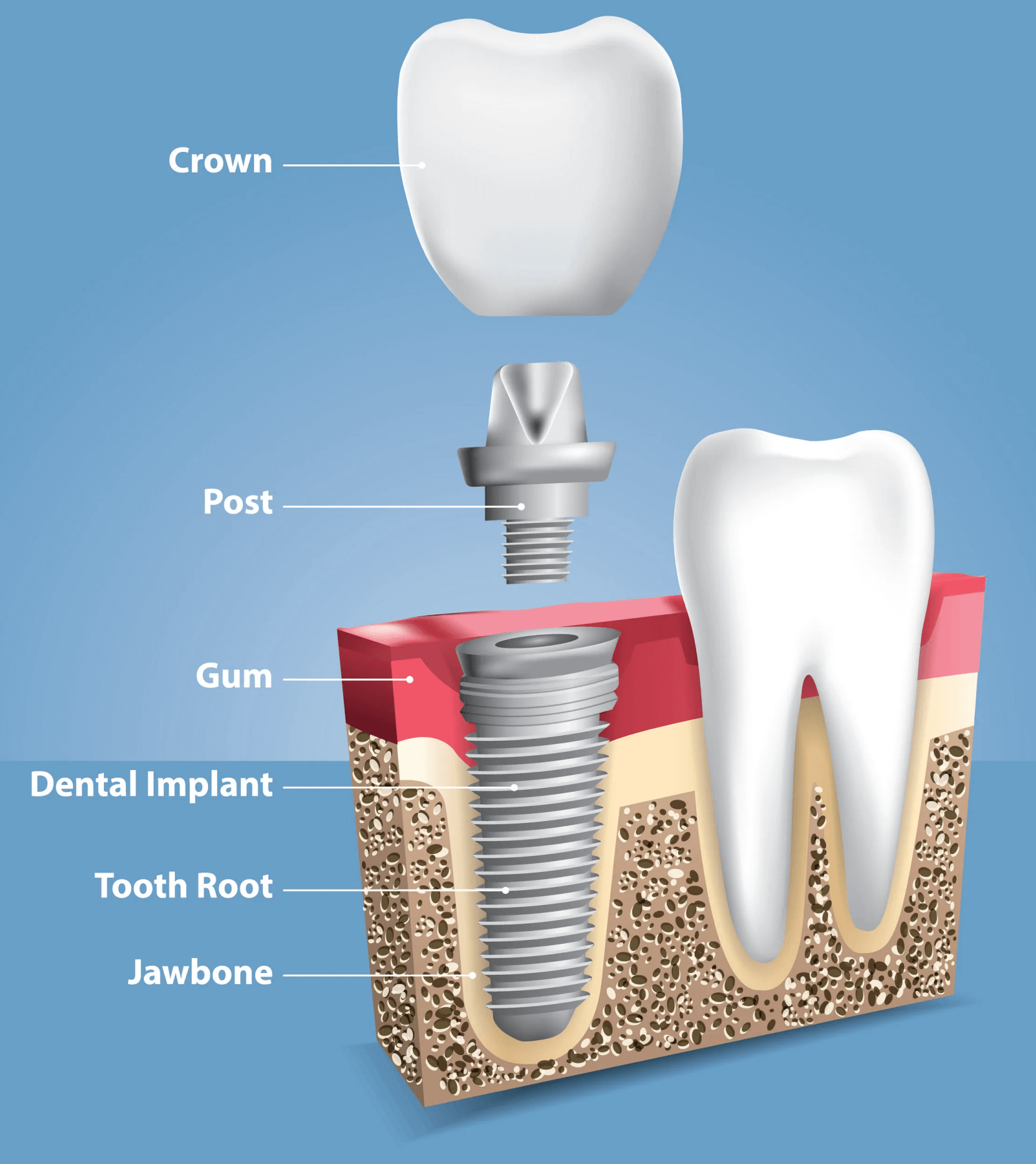
Types of Materials for Dental Implants
When it comes to dental implants, several materials are commonly used to create the implant post and the prosthetic tooth or crown. The two main types of materials used for dental implants are titanium and zirconia.
- Titanium Dental Implants: Titanium is the most widely used material for dental implant posts. This is due to its biocompatibility, which means it is well-tolerated by the human body and does not trigger adverse reactions or cause allergies. Titanium implants have a high success rate and can integrate well with the jawbone through osseointegration, providing a stable and long-lasting foundation for the prosthetic tooth.
- Zirconia Dental Implants: Zirconia dental implants have gained popularity as an alternative to titanium implants. Zirconia is a ceramic material known for its strength and natural tooth-colored appearance, making it an attractive choice for patients who prefer metal-free dental restorations. Zirconia implants are especially suitable for individuals with metal allergies or sensitivities. However, it’s essential to note that zirconia implants may not have the same level of osseointegration as titanium implants, and they may require more careful consideration when selecting the appropriate case.
Why Choose Us for Your Murray Dental Implants?
Opting for us for your dental implants means choosing a team of highly skilled and experienced dental professionals dedicated to delivering exceptional care and remarkable results. Our expert dentists and oral surgeons are knowledgeable in the latest implant techniques and technologies, ensuring you receive the most advanced and effective treatment available. We take a personalized approach, carefully evaluating your oral health with state-of-the-art imaging and diagnostic tools to identify the best implant options for your needs. With our friendly and inviting environment, you’ll feel comfortable throughout your dental implant journey. We have convenient office locations near you.
